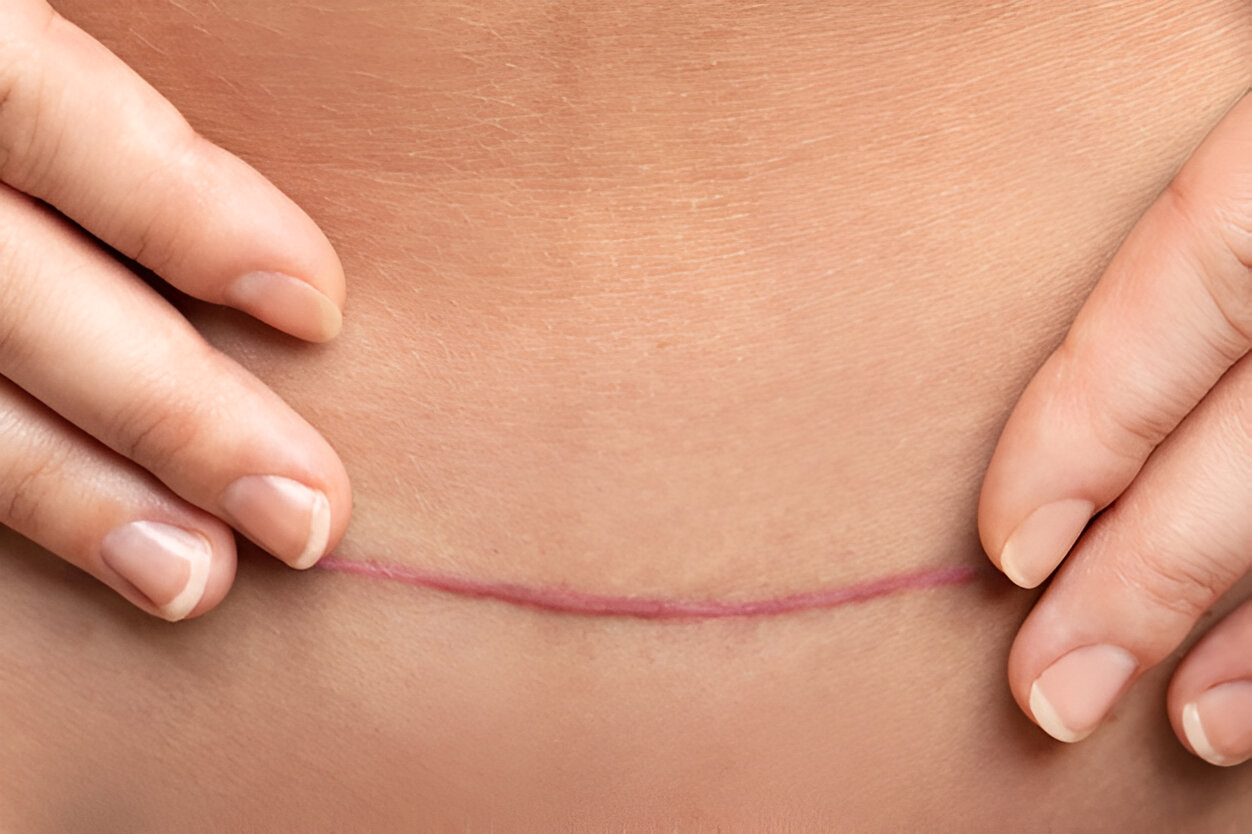
Have you recently had a C-section and noticed that your scar is starting to itch? Don’t worry, you’re not alone. Many women who undergo a Caesarean section experience itching around their incision site.
Yes, it can be uncomfortable and bothersome, but there are reasons behind this sensation. And today, I’ll be discussing the causes, treatment, and prevention of C-section scar itching.
What Causes C-Section Scar Itching?
There are several reasons why your C-section scar may be itching.
Healing Process
One of the top reasons why your C-section scar might itch is simply because it’s healing.
As your skin knits itself back together, nerves under the surface become active and new tissue forms. This can create a tingling or itching sensation.
Itching is a completely natural part of the recovery process. It usually means your body is working hard to heal the incision site.
Dry Skin
After a C-section, the skin around your scar may be drier than usual.
Dryness can make itching worse. Keep the area gently moisturized with doctor-approved creams or ointments, and avoid products with harsh chemicals or strong fragrances.
Nerve Regeneration
Nerves are sometimes cut or damaged during surgery. As they repair over time, it’s very common to experience weird feelings, including itching, tingling, or even numbness.
This can last for weeks or even a few months, but should gradually improve.
Scar Tissue Formation
Scar tissue, also known as adhesions, can replace normal skin after surgery.
This tissue can feel tight, raised, and often itchy. Some people are more prone to developing thick or bumpy scars, which may itch more than flat ones. These scars can also restrict movement or cause discomfort.
Sensitivity or Allergies
Following surgery, the skin around the incision may become sensitive to certain substances or irritants. This sensitivity can be temporary or permanent. Some people may also develop allergies to medications, dressings, or anesthetic agents used during surgery.
If you experience any unusual reactions after surgery, it is important to notify your doctor immediately. They can determine if these symptoms are related to the surgery and provide appropriate treatment.
Read More: Ashwagandha While Breastfeeding: What You Need to Know
How Can I Relieve C-Section Scar Itching?
If you’re asking, “Why does my C-section scar itch?” it means you’re probably more interested in relief than just knowing the cause.
Here are some simple, safe tips to soothe the itch:
- Keep it clean and dry: Gently wash the area with mild soap and water.
- Moisturize: Use hypoallergenic creams or ointments recommended by your doctor.
- Don’t scratch: Try to avoid scratching, as this can lead to infection or delayed healing.
- Wear loose clothing: Soft, breathable fabrics can help prevent irritation from clothing rubbing against the scar.
- Cool compress: Applying a clean, cool cloth to the area can offer instant itch relief.
If your itching is severe, persistent, or comes with pain or discharge please always consult your healthcare provider.
When to See a Doctor
Most of the time, C-section scar itching is normal.
But if you ever notice any of the following, call your doctor right away:
- Intense redness or swelling
- Pus or unusual discharge
- Fever
- Spreading rash or bumps
These may be signs of an infection or other issues needing prompt medical attention.
How to Prevent C-Section Scar Itching
Prevention is easier than you might think. Here’s what you can do:
- Follow wound care instructions closely
- Keep your incision site clean and dry
- Avoid perfumed lotions or irritating fabrics
- Stay hydrated for healthy skin
- Protect your scar from sun exposure
- Consider silicone scar treatment to reduce itching and discomfort
Helpful Foods for Scar Healing
Eating a healthy, balanced diet can also play a role in scar healing and prevention of itching. Here are some foods that may help:
- Foods high in vitamin C like citrus fruits, broccoli, and bell peppers promote collagen production for wound healing.
- Zinc-rich foods such as beans, nuts, and legumes have been shown to aid in tissue repair.
- Omega-3 fatty acids found in salmon, avocado, and olive oil can reduce inflammation and improve skin elasticity.
- Vitamin E-rich foods like spinach, nuts, and seeds may help with scar tissue formation.
How was My Experience
Dealing with scars was not just a physical challenge but also an emotional one. Initially, I felt self-conscious about their appearance and uncertain about managing them effectively. I started researching natural ways to improve healing and came across the importance of nutrition and skincare in the process.
By incorporating a diet rich in vitamin C, zinc, and omega-3s, I noticed gradual improvements in my skin’s texture and elasticity. Also, staying consistent with a moisturizing routine and using topical treatments recommended by professionals helped me regain confidence over time. This experience taught me the importance of patience and self-care.
Conclusion
If you’ve wondered, “why does my c section scar itch?”, you’re definitely not alone.
Itching is a sign that your body is healing, but it can be annoying. By keeping your scar clean, moisturized, and protected, and knowing when to ask for help, you can take care of yourself and have peace of mind.
Don’t forget to listen to your body and follow all post-operative care instructions closely, as everyone’s healing process is unique. While your c-section scar may never fully disappear, with proper care, you can minimize discomfort and feel confident in your body once again.
Frequently Asked Questions
What is a C-section?
A c-section, also known as cesarean section, is a surgical procedure in which a baby is delivered through an incision in the mother’s abdomen and uterus.
How long does a C-section scar take to heal?
The healing process can vary from person to person, but on average, it takes about 6-8 weeks for the incision to fully heal. However, some women may experience discomfort or itching for several months as the scar continues to mature.
What can I do to reduce scarring after a c-section?
To minimize scarring, make sure to keep your incision clean and moisturized as it heals. Avoid picking at scabs or irritants that may cause further damage.
Using silicone gel or sheeting on the scar can help improve its appearance. You can also talk to your doctor about massage techniques or laser treatments to reduce scarring.
Can I exercise after a c-section?
It’s important to listen to your body and not push yourself too hard after a c-section. Start with light exercise, such as walking, and slowly increase intensity over time. Avoid any activities that put strain on your incision until it has fully healed.
How can I take care of my mental health after a c-section?
Recovering from a c-section can be physically and emotionally challenging. It’s important to reach out for support from loved ones and to also take care of yourself mentally. This can include getting enough rest, talking to a therapist or counselor if needed, and finding ways to relax and de-stress.3
Can you get a tummy tuck after a C-section?
While some women may consider getting a tummy tuck after a c-section for cosmetic reasons, it’s important to wait until your body has fully healed from the surgery. This usually takes around 6-8 weeks. It is also important to consult with your doctor before undergoing any additional procedures.
Your doctor will be able to advise you on the best time and approach for a tummy tuck, taking into consideration factors such as your overall health and well-being. Remember to prioritize your physical and mental health above any cosmetic concerns.
Related Reading: Lack of Appetite Postpartum: Causes, Symptoms, and Treatment
